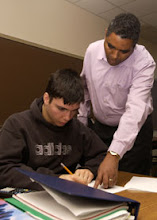Time to congratulate the candidates for their great American myth-busting powers!
"Don’t just go to one that has the highest price. Go to one that has a little lower price where you can get a good education. And, hopefully, you’ll find that. And don’t expect the government to forgive the debt that you take on."—Mitt Romney
What we heard: Public assistance is for Wall-Streeters, not Main Streeters!
“President Obama once said he wants everybody in America to go to college. What a snob!”—Santorum.
What we heard: College is for snobs! Who else can afford it?
The Great Meltdown of 2008-2009 has been really hard on our cultural psyche. Many of the myths, those little mantras that smooth over life’s truth, have been gutted like smelt prepared for a hot frying pan. You remember the one about no man is above the law? Well, no man that doesn’t don a three piece suit, black leather shoes and carry his custom attaché case to a financial institution near you. Or how about this one: work hard, follow the rule and you’ll get ahead. I’ll bet every homeowner who lost his/her home to foreclosure right after their unemployment ran out is beating themselves over the head wondering where they went wrong. With the American home dream lying in the morgue, no reason not to kill the ticket to the middle class myth, too. Perhaps, the candidates have even done us a favor.
The middle class has been a shrinking phenomenon for decades. According to the President’s Council of Economic Advisors chief, the dispersion of national income to the top 0.1 percent is now on par with the Roaring Twenties. According to the Congressional Budget Office the top 1% enjoyed a whooping 278 percent increase their real after-tax income in the period 1979 to 2007 before the Great Meltdown—the middle twenty percent of households--60%. The size of the middle class has been steadily shrinking. Krueger reports: “We have gone from having just over 50 percent of households with incomes within 50 percent of the median in 1970 to 44 percent in 2000, and 42.2 percent last year.” (http://blogs.reuters.com/great-debate/2012/01/13/a-shrinking-middle-class-means-a-shrinking-economy/)
Institutional changes, those little tweaks in the rules of the game—are cited as the main culprits for spiking income inequality: declining union membership, fall in the real value of minimum wage, and tax code changes since 2000s that compound the widening gap in pre-tax earnings. But the one not mentioned is the shift in financial burden from societal to private in the cost of the ticket to the middle class. A shift that innately implies that post-secondary education, in whatever formulation, is a pure private (individual) good like a Pay Day candy bar.
Yet, nothing could be further from the truth. Sustained long-term economic growth is propagated through growth in human capital: the skills embodied in workers through experience, education and on-the-job training. Humans are complementary inputs to every aspects of economic production from R & D and management to production on the floor. Humans dream up new technologies. Humans are the source of funding for private business investment. Learning-by-doing enables humans to push the edge of productivity gains. Humans set “the formal and informal rules that constrain human economic behavior.” (Douglass North, Nobel Prize winning economist, 1993) In short, growing an economy to improve our collective well-being is impossible without social investment in people—at least until the technological Singularity kicks in.
The U.S. Department of Education (2009) reported that 90 percent of bachelor’s degree recipients owe upwards to $40,000 of student loan debt. Those were graduates finishing at the end of the Great Meltdown. Since post-secondary schooling is not a public mandate, states short on revenue have taken the liberty to balance their unbalanced checkbooks on the backs of students. Compounding the problem for degree holders is job crunch. The labor force participation rate for all bachelor’s degree and higher job holders, according to the latest jobs report, is 76 percent. So, a degree in hand with no job in sight—education is proving to be a ticket to the underclass.
Least we believe that all hope is lost, here’s what the other candidate said: “This is about the nation’s welfare. It’s about making choices that benefit not just the people who’ve done fantastically well over the last few decades, but that benefits the middle class, and those fighting to get to the middle class, and the economy as a whole.”
What we heard: Education is an increasing sums game. It benefits everyone!
 Kay Strong, Ph.D., Southern Illinois University, M.T., University of Houston, M.A., Ohio University; Associate Professor at Baldwin-Wallace College; Areas of expertise: international economics, contemporary social-economic issues, complexity and futures-based perspectives in economics. E-mail: kstrong@bw.edu
Kay Strong, Ph.D., Southern Illinois University, M.T., University of Houston, M.A., Ohio University; Associate Professor at Baldwin-Wallace College; Areas of expertise: international economics, contemporary social-economic issues, complexity and futures-based perspectives in economics. E-mail: kstrong@bw.edu

No comments:
Post a Comment